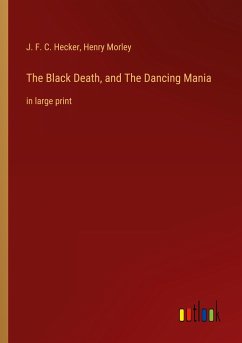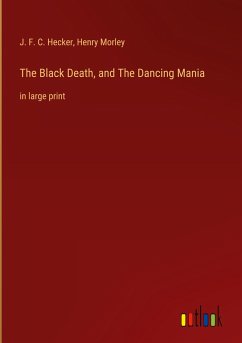
The Black Death, and The Dancing Mania
Versandkostenfrei!
Versandfertig in 6-10 Tagen
7,49 €
inkl. MwSt.
Weitere Ausgaben:

PAYBACK Punkte
4 °P sammeln!
In "The Black Death, and The Dancing Mania," J. F. C. Hecker offers a riveting exploration of two of the most enigmatic phenomena in medieval history. The text intricately weaves accounts of the catastrophic epidemic known as the Black Death with the perplexing social behavior of the Dancing Mania, presenting both as reflections of the psychological and societal strains experienced during the 14th century. Hecker's literary style is characterized by meticulous historical analysis fused with vivid narrative elements, engaging the reader in a scholarly yet accessible manner. Positioned within th...
In "The Black Death, and The Dancing Mania," J. F. C. Hecker offers a riveting exploration of two of the most enigmatic phenomena in medieval history. The text intricately weaves accounts of the catastrophic epidemic known as the Black Death with the perplexing social behavior of the Dancing Mania, presenting both as reflections of the psychological and societal strains experienced during the 14th century. Hecker's literary style is characterized by meticulous historical analysis fused with vivid narrative elements, engaging the reader in a scholarly yet accessible manner. Positioned within the context of 19th-century historiography, Hecker's work not only serves as a detailed chronicle but also a commentary on the human condition under duress. J. F. C. Hecker, a prominent German physician and historian, draws from his medical background to provide a unique perspective on the interplay between disease and societal reactions. His interest in contagion and folklore, alongside his adeptness at interlinking medical facts with cultural interpretations, heavily influenced his motivation for this scholarly endeavor. Hecker's dual expertise allows him to present a comprehensive view of how calamity shapes societal behavior and collective psyche. This book is highly recommended for scholars and enthusiasts of medieval studies, public health historians, and anyone intrigued by the intersection of crises and culture. Hecker's insightful analysis provides a strong foundation for understanding the psychological impacts of historical calamities, making it both an essential and thought-provoking read.













